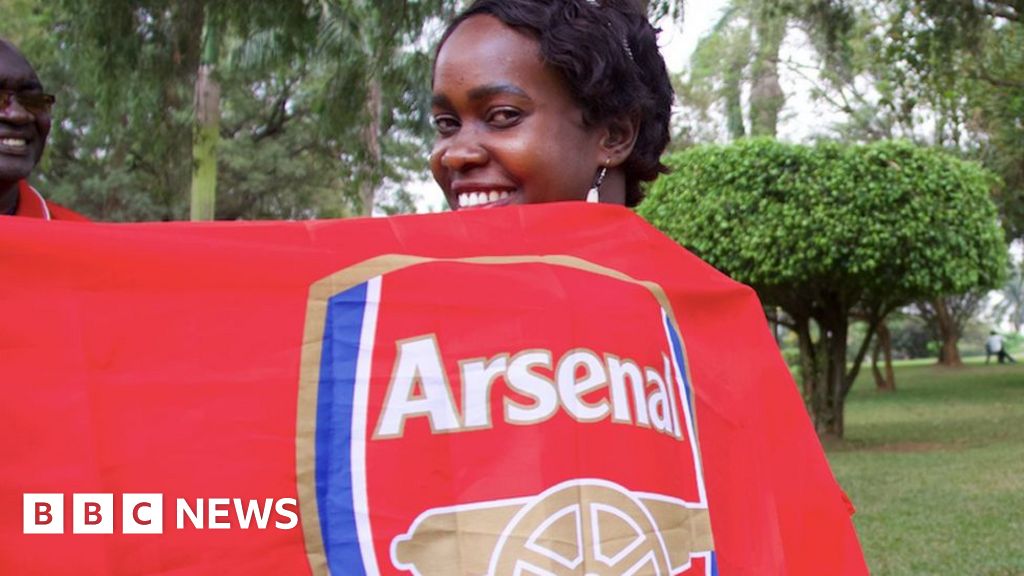BBC News, Kampala
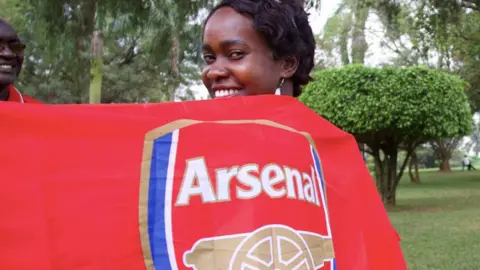 BBC / Wycliffe Muia
BBC / Wycliffe MuiaArsenal fans in Uganda partied well into the early hours this week, outside video halls and bars across the country, after their team’s stunning victory over Real Madrid.
The north London-based team won 3-0, at home, in the first leg of the Champions League quarter-final stage.
Such was the passion, the joy and the adulation shown to midfielder Declan Rice and his free kicks, you would be forgiven for thinking Arsenal was homegrown.
Whenever the club play, the East African nation knows about it. Alongside Manchester United, they are one of the English Premier League (EPL) teams with the biggest support in the country.
Church services, packed with fans decked in the Gunners’ red and white colours, have been held before big matches – with prayers offered up for a side that sometimes looks as though it needs divine assistance.
The passion for Arsenal and other English clubs has spawned an entire industry in Uganda, with shops and vendors selling jerseys and bigger companies targeting their advertising around the results, while for sports betting companies it is massive business.
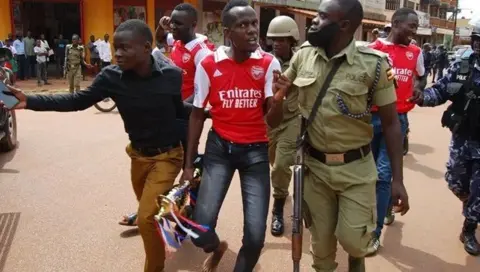 Jacobs Odongo Seaman
Jacobs Odongo Seaman“I have covered football across Africa for many years and I can tell you without a doubt that the soccer enthusiasm in Uganda is on another level,” veteran sports journalist Isaac Mumema told the BBC.
For Swale Suleiman, a Manchester United fan and mechanic I met at a garage in the capital, Kampala, the excitement lies in the fact that EPL matches are competitive, entertaining and sometimes unpredictable and even a “small team can cause an upset”.
Ugandan fan clubs have been set up for all the top English sides. WhatsApp groups keep the debates going beyond halls and bars.
But Arsenal fans seem to take it to another level – some have even been arrested for holding victory parades without police notice after winning big matches.
However, this type of fandom also has a much uglier side, with the love for the game sometimes turning to deadly violence as tempers flare between rival supporters.
“Our people naturally get attached to something wholeheartedly and Ugandans really love football,” Uganda Football Coaches Association (UFCA) chairman Stone Kyambadde told the BBC.
“This soccer fanaticism has even grown stronger with the young generation because they watch the English Premier League from anywhere,” he said.
They can keep abreast of scores on their phones, but it is mainly a communal event and even the most remote village will have a makeshift video hall where fans will pack in to watch matches.
But it was for a funeral that villagers near Lake Victoria gathered last December, to bury a 30-year-old carpenter who was shot dead while celebrating Arsenal’s victory over Manchester United.
Speaker after speaker lamented the loss of John Senyange, who had been a Gunner all his life.
He had been watching the match in a video hall in the town of Lukaya – and when spontaneous cheering erupted from Arsenal fans after the final whistle, it upset their rivals, including a security guard, who reportedly pulled the trigger.
Earlier in the season, about 300km (186 miles) away in the south-western area of Kabale, Manchester United fan Benjamin Ndyamuhaki was stabbed to death by an Arsenal supporter after the two argued over the results of the epic clash between Arsenal and Liverpool.
In 2023, there were four Premiership-related deaths in different parts of the country – two Arsenal fans were killed by Man Utd supporters, a fan died in mysterious circumstances after Man Utd were trounced 7-0 by Liverpool and another man died from stab wounds after trying to intervene in a fight after Arsenal lost to Man Utd.
Football violence in Uganda dates back to the 1980s when local games were characterised by stone-throwing and fistfights between rival fans.
“There has always been cases of violence whenever Express FC and SC Villa – the two main local teams in Uganda – have a major derby,” sports scientist Lumbuye Linika told me at a football pitch in Kampala.
But things have become much worse – a situation experts blame on fanaticism fuelled by gambling, with many men trying to earn their living by placing bets.
In a tragic case several years ago, police said a man killed himself with poison after losing money in a bet.
With the rise of online gambling, it just takes a second to place a bet via an app on your phone which brings the hope of winning big coupled with bragging rights.
Gaming companies have also taken advantage of the Ugandan obsession with the EPL, setting up viewing centres where fans can watch games and place their bets.
This is where the trouble often brews – with rival fans teasing each other when their bets fail.
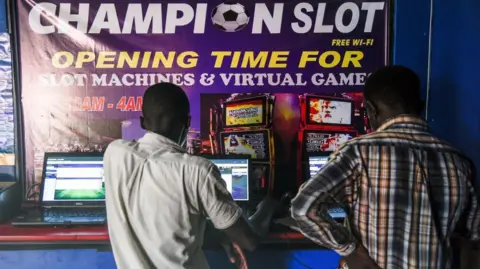 AFP
AFP“With limited job opportunities, many football fans are turning to betting as a way to earn quick money,” said Amos Kalwegira, who stopped to chat to me one Monday morning on a street in Kampala when I spotted him in a Man Utd shirt.
“This has become an intense emotional investment which often quickly turns into aggression when soccer results aren’t favourable.”
For Mr Linika this is all proving corrosive: “Football should make us happy and Western soccer is supposed to be a form of entertainment but here in Uganda we have turned it to be a way of earning a livelihood, spoiling the fun.”
But Collins Bongomin, a senior officer in one of Uganda’s betting companies, said the industry should not be blamed for football violence.
“People just lack sufficient knowledge on managing expectations and anger,” he told the BBC, noting industry efforts to encourage responsible gambling.
With more than 2,000 betting shops across the country, it is also proving lucrative for the government, which collected about $50m (£40m) in tax revenue from gambling last year, according to local media.
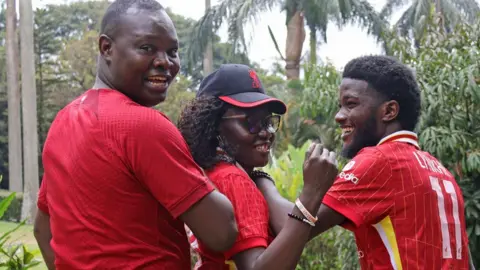 BBC / Wycliffe Muia
BBC / Wycliffe MuiaSome note that the lethal rivalry mainly involves Uganda’s Arsenal and Man Utd fans, suggesting this has something to do with age and background.
Mr Linika, a Liverpool supporter, said his team tended to attract an older crowd and those that were slightly better off – with Arsenal’s and Man Utd’s fanbase drawn from poorer areas.
“Currently we are on top of the Premier League table and you rarely hear about a Liverpool fan involved in violence,” he said.
Pamela Icumar, popularly known as Mama Liverpool because of her ardent devotion to the Reds, agreed that her fellow fans knew how to manage their emotions “even when we’re losing”.
But Arsenal fan Agnes Katende laughed this off when I met up with them both in Kampala – the two women are part of a dedicated female following of the EPL. Ms Icumar is even part of a female only fan club.
For Solomon Kutesa, secretary of the official Arsenal Supporters Club in Uganda, the country’s drinking culture is to blame for the football violence.
“Some of the fans watch the games while intoxicated and it becomes hard to manage them when their teams lose,” he told the BBC.
Some suggest getting fans back into local stadiums and out of bars could curb the hysteria – and help revitalise the Ugandan Premier League.
“The current generation only knows about the European soccer. If we invest more on the local league we could manage to disrupt a lot of attention given to foreign games,” said Mr Kyambadde, while acknowledging it suffered from a bad reputation and lack of star power.
Former footballer Tom Lwanga, who played for Uganda’s national team when the Cranes reached the finals of the 1978 Africa Cup of Nations, agreed.
“We became famous because we used to play when stadiums were full. We need to return to that era and manage the frenzy with European football,” he told me in the empty stands of Kampala’s Phillip Omondi Stadium as we watched a local match.
Others blame the lack of live television broadcasts for the decline of the Ugandan league.
Asuman Basalirwa, chair of the Ugandan Parliamentary Sports Club, who was also at the Omondi stadium, is among those trying to boost the local game.
“I’m among the few MPs who watch local football and we want to see more leaders, even the president, coming to the stadiums to support local teams,” he said.
But for Mr Kutesa, whose love of Arsenal dates back to the days of players like Nwankwo Kanu and Thierry Henry, the next few weeks are all-important.
“Our emotions right now are high. We are where we belong and this is definitely our season,” he said back in February.
While it appears their title bid is over, they are in a strong position to qualify for the Champions League semi-finals for the first time in 16 years, as long as they avoid a disaster in Wednesday’s second leg against Real Madrid.
You may also be interested in:
 Getty Images/BBC
Getty Images/BBCSource link
